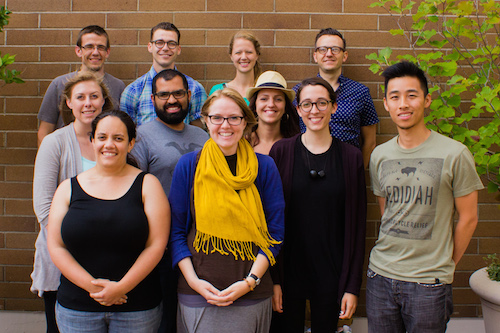Living Sent (For the Relationally Challenged)
Discipleship, City Life, Teaching | by
Pastor Adam Sinnett
 Over the past few weeks our first overseas short-term ministry team has been working in Rio de Janeiro, Brazil. Their primary aim has been to resource and support local church planting efforts there, most of which are located in massive slums littered throughout the city. You can see photos and updates from their time in Brazil on the Facebook page created for the trip here.
Over the past few weeks our first overseas short-term ministry team has been working in Rio de Janeiro, Brazil. Their primary aim has been to resource and support local church planting efforts there, most of which are located in massive slums littered throughout the city. You can see photos and updates from their time in Brazil on the Facebook page created for the trip here.
We are sent wherever we are
In light of the recent Brazil trip, this is the perfect time for us to remember that, though they are there and we are here, we are all sent wherever we are, across the street and around the world. Jesus said, “As the Father has sent me, even so I am sending you.” (Jn 20:21) In other words, Jesus’ people are a sent people – sent with the forgiveness-bringing, shame-destroying, life-changing news of Jesus Christ into our neighborhoods, apartment complexes, offices, and local coffee shops. If you are in Christ, you are sent. In Him, we are a movement of missionaries.
Help for the relationally-challenged
Some of you are extroverted, out-going, relational rock stars. We all know who you are. So, for me to encourage you to talk to people or offer ideas about how to intentionally pursue others can almost feel insulting. Some of you have even told me that. “It feels so forced.” Well, it is important to note that there is another group, let’s call them the relationally-challenged, who need all the help they can get. I am a proud member of this group and this, my friends, is for you.
For the relationally-challenged, any time the topic of sharing the gospel with another human being comes up, anxiety, guilt and countless questions are not far behind. Are you talking to me? Are you saying I need to become an extrovert? I don’t even know how to start a conversation. What if I say the wrong thing? What if they ask me a question I don’t know the answer to? What if they get offended? Do I have to do it? Will anyone be with me? What if I don’t have the gift of evangelism? These are all valid questions and concerns, but let me put you at ease. Living sent is all about loving people to Jesus, as best you can.
Redefining sent living
Don’t make living a sent life yet another thing that you add to your schedule. You probably don’t have time for anything else anyways. Instead, do what you are already doing as one sent by Jesus. Living sent is not merely another thing to do, but the posture by which we do all things we’re already doing. Rather than seeing the grocery store clerk (or barista, neighbor, co-worker, friend or family member) as a mere grocery store clerk, see them as a fellow image bearer in need of a Redeemer – and get to know them. You don’t have to share the gospel with them the first time you meet them. In fact, you probably shouldn’t. Take interest in them. Ask questions. Listen. Smile. Pray, pray, pray. Before you know it, you’ll have a relationship on your hands. When the opportunity arises to talk about Jesus, ask the Holy Spirit to guide you and leave the results up to Him. That’s it. Don’t over-complicate it.
Intentionality and the sent life
Yet, living sent does require some intentionality on our part. Who is God calling you to intentionally pursue and build relationships with – even this summer? Who are the top five people in your life that you could intentionally invest in, pray for and pursue this coming season? Of those you already have relationships with, what would it look like to lovingly, winsomely and boldly speak to them about the gospel? What are your first steps of faith as you seek to live sent? What follows are some suggestions as you seek to live an intentionally sent life:
- Begin each day with a prayerful sense of expectancy and anticipation. Ask God to give you eyes to see the ways He is already moving around you.
- Eat, grab a coffee or ‘happy hour’ with a non-believing friend once a week.
- When you’re going out to do something, ask “Is there anyone I can invite to join me?”
- Rather than jumping between different cafes, barber shops and grocery stores, pick your favorites and be a regular. Get to know the staff.
- Spend time with non-believers on their turf. Do your best to never turn down an invite.
- Try walking whenever you can, if you’re in a context where that makes sense.
- Leave margin in your schedule so you have time to stop and chat throughout the day.
- Participate in neighborhood events. There are a ton of things happening throughout the year, especially during the summer, all around our city (block parties, concerts, outdoor movies and more).
- Become the apartment in your complex, or house on your block, that throws the parties. Be sure to welcome new neighbors as they move in.
- Consider how you could serve and/or meet a need of those around you.
- Take time to develop meaningful relationships with your co-workers.
- Volunteer for a cause you’re already passionate about and invite others to join you.
- Sign-up for a city sports league and get others involved.
- Take some time to write out down the gospel so you’re not stuck thinking, “I don’t know what to say” when the time comes. What verses would you lead others to? Keep it simple.
- Consider it a step of faith to ask the first question or share your own struggles or give a gift.
- Don’t try to impress. Ask questions. Listen. Be honest, open and sincere. God made you like you are on purpose. Embrace that, don’t reject it.
- Ask God to do what only He can in and through you, for His glory and the good of as many as possible – and leave the results in His hands.
“How beautiful are the feet of those who preach the good news!” (Rom 10:15)
Until Seattle (and the world) knows,
Pastor Adam
 Downtown Cornerstone is not just interested in holding events but want people to connect, share life and form communities that are deeply rooted in the gospel of Jesus Christ. These are communities of diverse imperfect people that are committed to living out the implications of the gospel in every sphere of life. These are communities of radical grace, sacrificial service, and joy. These are communities that eat together, pray together, laugh together, and study the Bible together (i.e. share life). These are communities that build up the church by encouraging people to faith in Jesus Christ and build up the city through deeds of justice and mercy. These are communities where you can be who God created you to be, yourself. It’s our hope and prayer that everyone who calls Downtown Cornerstone home will find such community.
Downtown Cornerstone is not just interested in holding events but want people to connect, share life and form communities that are deeply rooted in the gospel of Jesus Christ. These are communities of diverse imperfect people that are committed to living out the implications of the gospel in every sphere of life. These are communities of radical grace, sacrificial service, and joy. These are communities that eat together, pray together, laugh together, and study the Bible together (i.e. share life). These are communities that build up the church by encouraging people to faith in Jesus Christ and build up the city through deeds of justice and mercy. These are communities where you can be who God created you to be, yourself. It’s our hope and prayer that everyone who calls Downtown Cornerstone home will find such community.

 Over the past few weeks our first overseas short-term ministry team has been working in Rio de Janeiro, Brazil. Their primary aim has been to resource and support local church planting efforts there, most of which are located in massive slums littered throughout the city.
Over the past few weeks our first overseas short-term ministry team has been working in Rio de Janeiro, Brazil. Their primary aim has been to resource and support local church planting efforts there, most of which are located in massive slums littered throughout the city. 
